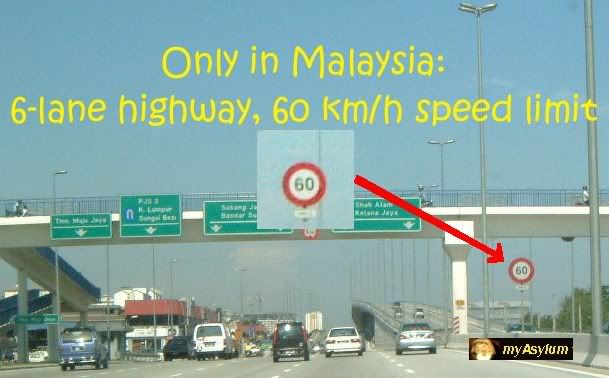Fine for Speeding: Cause, but no Effect?
Technorati tags: Humor, Malaysiana, Observations, Highway, Road Etiquette
This post is really about why the $-amount of traffic fines means diddley squat when it comes to road safety. But first, a silly anectdote.
A Mercedes Benz was pulled over by the police one fine day on the NKVE. The driver rolls down the window, as the police officer approaches.
Police: Good afternoon, sir.
Driver: What's the problem officer?
Police: Are you aware that you were doing 150km/h in a 110km/h zone.
Driver: Yes, but I thought the sign said "Fine for Speeding"
Okay, admittedly that was pretty lame, as far as jokes go. Walski just couldn't resist. But in a way, it does relate to the picture below, which Walski took on the New Pantai Expressway, sometime last year (when he still had a working camera).
 Most cars don't even bother with this ridiculous speed limit
Most cars don't even bother with this ridiculous speed limit
Nice road, with wide lanes - 3 in each direction on most of the stretch, in some places 5 - but with a w.t.f. 60 km/h speed limit! Needless to say, hardly any driver ever sticks to it, with most going anywhere between 90 - 120 km/h (yours truly included). To the best of Walski's knowledge, no one's been booked for speeding there, though.
Which brings us back to the traffic offense fines. The reduced traffic fines proposed by the police really raised a maelstorm of opinions saying that it was a bad idea, that it would encourage more people to break the rules, etc. And by the way, the proposed reduction in fines has, as of today, been put on hold by the cabinet, as reported in The Star.
Our politicians are really great at over-reacting to the slightest of noises, aren't they?
But consider this: the reduced fines proposed are pretty much back to the levels of about 4 - 5 years ago, when they were raised drastically, to the RM 150 - RM 300 levels of today. And what effect did raising the fines do to the road fatality rate between then and now?
(more non-correlated rants in the full post)
Well, surprise, surprise - the accident and fatality rates have actually increased! And what effect would lowering the fines have? Walski's guess is that the accident and fatality rates will continue to increase, pretty much at the same pace as they have been.
In other words, the $-value of traffic fines has no real correlation with road safety. It's just like saying increasing the price of cigarettes will reduce the number of smokers (which it hasn't), or increasing the price of passports will encourage more local tourism (which, again, it hasn't).
The real solution to reducing our road accident rates involves a sh*tload more than just adjusting the traffic fines. In a nutshell, Walski sees major problems in the following areas, among others (they're too complex and long drawn to properly elaborate here - perhaps Walski will delve into it more in future posts):
→ Our driving curriculum and testing system
→ The Demerit System, which doesn't work as intended
→ Poor road design, construction, and most of all, maintenance
→ Poor road signage, and a consistent standard for signage
→ Poor lane demarcation and on-road arrow standards
→ Need for rationalization of speed limits, and last but not least,
→ Enforcement
So, it's not just about how much traffic fines an errant driver has to pay. But as always, our elected leaders always tend to choose the easy and obvious to pick on, as do most Malaysians, based on the reaction to the fine reduction.
Granted, the behavior of the typical Malaysian driver must change - no doubt about that whatsoever. But it has been proven in the past that increased traffic fines have not managed to change that.
As for speeding, it's Walski's belief that a safe speed is one that allows the driver to stay in lane. But then again, we all know what lanes mean to a lot of drivers, now, don't we? Yeah, yeah, blame it on gravity and black holes....
















